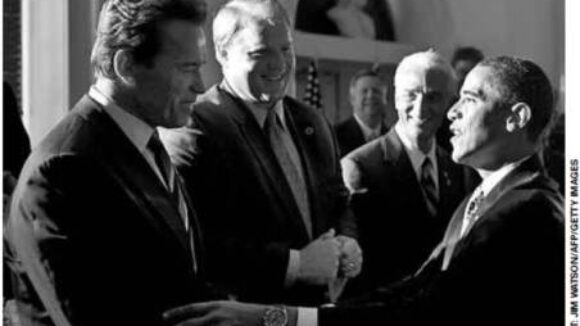Christie Battles Big Labor
New Jersey Gov. Chris Christie (R) is doing his best to ensure the Garden State does not go bankrupt but he can’t do anything about the moral bankruptcy of New Jersey’s labor union bosses who have…

New Jersey Gov. Chris Christie (R) is doing his best to ensure the Garden State does not go bankrupt but he can’t do anything about the moral bankruptcy of New Jersey’s labor union bosses who have…
The brain trust at the top of the AFL-CIO is demanding that the federal government cut its programing ties with law enforcement officials in Arizona. Arizona has become the kidnapping capital of the United States with a virtual invasion across…

In an outrageous display of intimidation, SEIU activists violated private property and stormed the home of Bank of America executive Greg Baer. When Rockville, MD police arrived they discovered two DC police cars…
To the union bosses, Mickey Kaus’ run for the Senate against Big Labor water carrier Barbara Boxer is like the skunk at the proverbial Labor Day picnic. But to millions of Americans, Kaus is a modern day…

Government Union Monopolists Have Brought State to Brink of Ruin (Source: May 2010 NRTWC Newsletter) From 1999 to 2009, according to the U.S. Labor Department, New Jersey's private-sector employment fell by 2.4%, a percentage decline seven times worse than the national average. Over the same period, New Jersey's state and local public employment jumped by a whopping 15.2%, substantially more than the hefty-enough nationwide increase of 12.5%. For most hard-working Garden State workers and employers, these statistics sum up why New Jersey is in even worse shape, economically, than the nation as a whole. For years, the state's heavily unionized public sector has been sucking resources and vitality out of beleaguered private-sector employees and businesses. But for government union officials, the relentless expansion of the Garden State's public-sector employment from 1999 to 2009, even as the state's private-sector employment alternately stagnated or shriveled, is a magnificent achievement that must be preserved and built upon, whatever the cost. During his successful campaign for the state's highest executive office and since he was inaugurated in January, GOP Gov. Chris Christie has sided with the vast majority of New Jerseyans who appreciate that state and local government must now be rolled back to give the private sector room to grow.

Government Union Monopolists Have Brought State to Brink of Ruin (Source: May 2010 NRTWC Newsletter) From 1999 to 2009, according to the U.S. Labor Department, New Jersey's private-sector employment fell by 2.4%, a percentage decline seven times worse than the national average. Over the same period, New Jersey's state and local public employment jumped by a whopping 15.2%, substantially more than the hefty-enough nationwide increase of 12.5%. For most hard-working Garden State workers and employers, these statistics sum up why New Jersey is in even worse shape, economically, than the nation as a whole. For years, the state's heavily unionized public sector has been sucking resources and vitality out of beleaguered private-sector employees and businesses. But for government union officials, the relentless expansion of the Garden State's public-sector employment from 1999 to 2009, even as the state's private-sector employment alternately stagnated or shriveled, is a magnificent achievement that must be preserved and built upon, whatever the cost. During his successful campaign for the state's highest executive office and since he was inaugurated in January, GOP Gov. Chris Christie has sided with the vast majority of New Jerseyans who appreciate that state and local government must now be rolled back to give the private sector room to grow.

In 2007, Senator Arlen Specter voted for the Card Check Forced Unionism bill when he was a Republican. Then, in 2009, he helped block the Card Check Forced Unionism bill when he was a Republican. In the first session…

But Hawkeye State's Popular Right to Work Law Still Under Fire (Source: May 2010 NRTWC Newsletter) Over the past four years, union lobbyists in Des Moines employed every conceivable tactic to ram through the Hawkeye State Legislature legislation gutting Iowa's popular, six-decade-old Right to Work law. Again and again, union officials have threatened to recruit and bankroll primary challengers to run against Democratic legislators who refused to back forced union fees. This March, one union lobbyist is even alleged to have told a state lawmaker, "You could have $100,000 in your account to fight off any challenger," if he switched his position and voted for the forced-union-fee bill then pending in the Legislature. However, the National Right to Work Committee and its grass-roots ally, the Des Moines-based Iowans for Right to Work Committee, energized freedom-loving Iowans to fight back every step of the way. And this spring, the Big Labor politicians who run the Iowa House and Senate finally backed down and adjourned the 2010 session without ever bringing up for a vote H.F.2420, the Right to Work-gutting measure introduced in the 2009-10 Legislature. Union Bosses Remain Determined To Destroy Right to Work Law Not taking anything for granted, the National Right To Work Committee legislative department kept the heat on until the Iowa Legislature called it quits after an unusually short 2010 session on Tuesday, March 30. And the battle to save Iowa's Right to Work law is far from over even now.
The boss of the largest union representing federal workers questioned the wisdom of President Obama’s policy to direct federal construction contracts to companies associated with big labor. John Gage, the head of the American Federation of Government Employees is concerned…